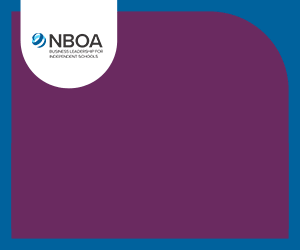Interview by Cecily Garber
Contance Neary is vice president for risk management and Alex Miller is associate vice president of research and program development at United Educators, which provides liability insurance and risk management services to schools, colleges and universities.
Net Assets: What advice do you have for independent schools looking to allocate their risk management resources strategically?
Constance Neary: We generally advocate schools use a number of data points and resources to inform those decisions. First and foremost, consider what’s happening on your campus and the proverbial question, “What keeps you up at night?” From there, the prudent business officer might look to peer schools and institutions in the school’s region and consider what they’re worried about. Studies on the most common and most costly claims, like research from United Educators, can also help schools decide what might be a risk management priority. In most cases, a risk management program should focus on a few risks at a time since there simply aren’t a lot of hands on deck or unlimited resources.
Net Assets: In addition to the claims report, you also survey independent school leaders about their top areas of risk each year. Have you seen any significant changes over the past couple years?
Neary: Of the ten “top-of-mind” risks reported in UE’s 2019 independent school survey, nine carried through from 2018. Enrollment and sexual misconduct remain top concerns. International travel dropped off the list, and the risk that first appeared in 2019 and vaulted to a top-three concern is external pressures. Leaders increasingly are concerned about circumstances or dynamics that exist outside their schools over which they have no control, but at the same time create tremendous challenges. Survey responses included: economic recession, relations with foreign countries (e.g., China), market trends in education, declining interest in boarding schools, stock market volatility and financial instability of families. In the sphere of higher education, we are seeing an increased rate of institutional mergers and closures, so financial sustainability is a top-of-mind issue for colleges. Based on the independent school survey results, financial health is an increasing concern for school administrators as well.
In last year’s report, one of the top-three risks was what we call “operational pressures” — rising costs, managing the budget and allocation of precious resources. Recent survey results suggest that external pressures are now more concerning than operational pressures. While both are part of the business model, external dynamics worry administrators given the lack of control and impact on financial sustainability.
Public awareness about sexual abuse and expectations for schools are higher than ever, which suggests that the environment is changing in a way that likely will lead to more reports of sexual abuse.
Net Assets: You’ve told me that nothing much in UE’s claims studies surprises you because you work on these issues every day, but have you seen anything that would be notable to schools?
Neary: The liability risks that surface in UE’s claims studies, for the most part, are not new risks – so no, specific risks —for example, slip and falls, athletic injuries, employment discrimination— are not surprising to schools either. However, what is new is the degree to which public engagement around issues of sexual misconduct has changed dramatically over the past six or seven years. It’s now a national conversation, from the #MeToo movement to the Boston Globe Spotlight articles to headline news about schools that didn’t take steps to protect their students from sexual abuse. Public awareness about sexual abuse and expectations for schools are higher than ever, which suggests that the environment is changing in a way that likely will lead to more reports of sexual abuse. There’s no doubt that schools must have the policies and processes in place to deal with these complaints. The work that colleges and universities have undertaken since the Obama Administration to address sexual misconduct has arrived at independent schools.
Alex Miller: Because education has been seen as such an unalloyed good for society, people have high expectations for schools, and it’s a risk because schools want people to maintain a positive view of educators. How institutions respond matters a lot because we don’t want education to suffer some of the challenges we’ve seen with the Catholic church. It’s a leadership challenge. Senior leadership must be very vocal about what the culture of an institution needs to be.
Independent schools are small communities, folks have worked there for years, and changing the code of conduct around what’s appropriate and inappropriate can be difficult.
Net Assets: Would you recommend any new ways to educate staff, faculty and students about sexual misconduct issues and successfully mitigate that risk?
Neary: One thing that’s distressing to me is that more than 10 years ago, United Educators compiled a policy and audit guide on sexual misconduct and protecting children from abuse, and not much about what schools need to do to manage this risk has changed. But the extent to which schools have policies and reporting structures in place, and are actually using them and enforcing behavioral codes, is another question. That’s not a resource issue. It’s a commitment issue. The critical question is, why can’t we do it?
Independent schools are small communities, folks have worked there for years, and changing the code of conduct around what’s appropriate and inappropriate can be difficult. Especially tricky are beloved faculty members who’ve been there for 20, 30 years. Intense, deep relationships with faculty often set an independent school experience apart from that at the local public high school. To the extent that’s a differentiator, schools need to do more work around defining what they mean by intense, deep relationships with faculty.
Miller: It’s exactly those types of relationships that make independent schools so special. You need those opportunities, but you also need boundaries and some mechanism whereby you’re looking into these relationships. Are you training people on the state mandate to report child abuse? Are you enforcing your policies? Do you have a reporting mechanism? And is there a way for the community to easily report a problem directly to the board, such as a website form? That’s standard practice in the corporate world and government, but not too many schools do it.
It’s not about creating a culture of surveillance. It’s about establishing norms. People who conduct themselves in good faith and mean well should want to have a community where everybody is clear about acceptable behaviors. There should be a way to do it where you’re not giving up anything, but rather gaining a greater sense of safety and a stronger, better community. That may require having an uncomfortable conversation. You might have to let some people go or have bad news come out. But it’s preferable to letting things fester.
Employers may think, “I’m just making an honest business decision and have no discriminatory intent or animus,” but you always have to look dispassionately at the impact of employment decisions.
See "With Justice For All" for more on conducting an investigation into misconduct allegations.
Net Assets: I see from the latest claims study that discrimination claims brought the largest losses for independent schools last year. How can schools mitigate that risk?
Miller: First, it’s important to have a human resources specialist who is adept at handling situations with a risk of discrimination or an unfair treatment claim. It’s also important to involve legal counsel because, in a lot of cases before making a big employment decision, you’re better off talking with a lawyer first. This may not be feasible for all independent schools, but this is the world we live in. Employers may think, “I’m just making an honest business decision and have no discriminatory intent or animus,” but you always have to look dispassionately at the impact of employment decisions.
Documentation can also be challenging. Are supervisors taking good notes and documenting issues well in advance of making a decision? That will show the separation had nothing to do with discrimination.
Neary: Vis-à-vis your employees and students, the most significant action you can take is terminating employment or expulsion. Those are high-risk decisions. Does your school have checklists and processes in place for handling those decisions? Have you looked at a decision from all angles to ensure that it is appropriate and entirely defensible?
If your school has limited resources, put some of them into understanding disability discrimination. What are my rights as an employer to require people to work? How do employees document a disability? How do I accommodate a disability? The way disability intersects with the Family and Medical Leave Act is another area of confusion. It’s a minefield.
Net Assets: What areas of risk are schools managing especially well?
Neary: I was pleasantly surprised that the independent school claims study revealed very few claims regarding athletic concussions. UE has done a lot of work around concussion management and protocols, and I think schools have good processes around that now.
We also didn’t see a lot of international travel claims. In all my work with independent school administrators, those running global study programs seem particularly stressed out. They worry and think about everything that could go wrong. The Hotchkiss case [in which the court upheld a $41 million verdict against the school for negligence in student care abroad] certainly got the attention of heads of school, which was a relief for study abroad administrators because it wasn’t just them worried about all the risks involved in school-sponsored trips and international travel. So, I would wager there are more resources and protocols to make sure risk management is in place for international education opportunities, and that’s resulted in fewer claims.
Download a PDF of this article.





